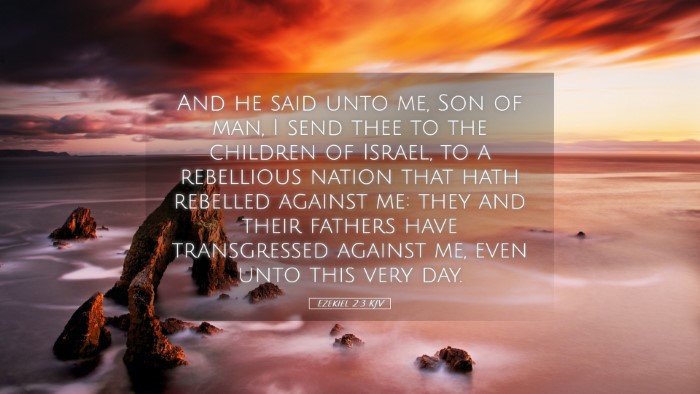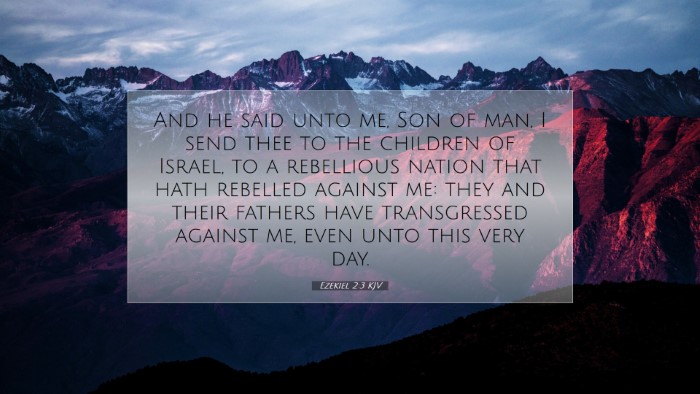Ezekiel 2:3 - Commentary Summary
Bible Verse: "And he said unto me, Son of man, I send thee to the children of Israel, to a rebellious nation that hath rebelled against me: they and their fathers have transgressed against me, even unto this very day."
Contextual Overview
The book of Ezekiel is a prophetic work attributed to the prophet Ezekiel, who lived during the Babylonian exile of the Israelites. This particular verse marks a critical moment in which God commissions Ezekiel as a prophet to a nation embroiled in rebellion. Understanding this verse requires a grasp of the historical and spiritual backdrop of Israel at the time.
The Call of Ezekiel
Matthew Henry's Commentary: Henry emphasizes the divine authority in Ezekiel's calling, highlighting that God personally addresses Ezekiel as "Son of man". This title not only indicates Ezekiel's humanity but also sets a tone of humility before the divine mandate. This divine commission signifies that Ezekiel's mission is neither self-initiated nor voluntary but is a response to God's will.
Albert Barnes' Commentary: Barnes elaborates on the term "children of Israel", pointing out that this refers to the entire nation that had a history of rebellion against God. The mention of "a rebellious nation" underscores the gravity of their situation, showing their continual defiance against divine standards. Barnes notes that God is sending Ezekiel as a messenger to those who desperately need to hear the truth despite their unwillingness.
Adam Clarke's Commentary: Clarke highlights the emotional weight of the message Ezekiel is to deliver. He notes that the Israelites, described as a rebellious nation, had not only strayed from God's commandments but had also corrupted their ways for generations. This passage emphasizes God's patience and persistence, as He continues to reach out to His people despite their persistent disobedience.
Characteristics of the Nation
- Rebellion: The repeated theme of rebellion reflects a profound spiritual deterioration. The Israelites have rebelled not just against God's laws but also against His character.
- Transgression: The verse mentions that both the current generation and their ancestors have transgressed God's commands, indicating a historical inertia towards sin.
- A Call to Repentance: In sending Ezekiel, God offers hope; the message is intended not just for condemnation but as a call to return to Him.
The Role of the Prophet
Being called to a rebellious people is no small task. Ezekiel's role entails not merely delivering judgment but also imparting a message of hope and restoration. His prophetic ministry would engage him intimately with the struggles and sufferings of his people.
Matthew Henry further notes: Ezekiel's prophetic office is significant because it illustrates how God engages with humanity — a compassionate act in which even rebellious hearts are sought after. This establishes the profound importance of obedience and accountability within the prophetic mission.
Lessons for Modern Believers
- The Nature of God’s Call: Just as Ezekiel was called to a difficult task, modern believers are also called to witness in challenging circumstances, often among those who resist the truth.
- Hope for Redemption: Despite the apparent hopelessness in rebellion, God’s ongoing outreach signifies His intent for redemption — a powerful message for ministry today.
- The Weight of Responsibility: Taking on the role as a messenger of God requires acknowledging the severity of the mission and the need for divine assistance.
Theological Implications
This verse encapsulates the profound tension between divine sovereignty and human free will. God, in His sovereign grace, sends prophets like Ezekiel to intervene in human history, urging repentance and offering mercy, illustrating that even in rebellion, God’s desire is for reconciliation.
Albert Barnes remarks: The legacy of rebellion underscores the weight of prophetic revelation; it is a call to accountability that echoes throughout generations. This compels scholars and theologians to reflect on the nature of human rebellion and God’s persistent outreach.
Conclusion
Ezekiel 2:3 serves as a poignant reminder of God’s long-suffering nature towards His people. As pastors, students, and theologians reflect on this verse, they are called to consider their roles in the continuation of God's outreach to a world entrapped in rebellion. The parallels between Ezekiel’s experience and modern ministry challenge contemporary believers to engage faithfully with the text and respond to their divine call amidst the complexities of their contexts.


